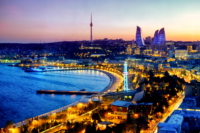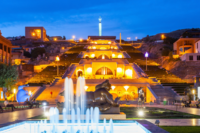
Armenia and Azerbaijan need a peace deal not theatrics
In recent weeks, a highly politicised debate has elevated the Lachin road all the way to the UN Security Council. The route connects Armenia to Qarabağ in Azerbaijan, a region it illegally occupied for over 30 years. Yet the ongoing drama shouldn't overshadow a simple, basic reality: the most urgent priority for Armenia and Azerbaijan should be a lasting, sustainable peace agreement based on international law.
Britain is Azerbaijan’s largest foreign investor. Peace in the South Caucasus – a region between Russia, Turkey and Iran – could help secure its post-Brexit goals. It lies at a strategic land bridge between Europe and Asia. Through it runs the fastest train freight line between the two continents. Britain has joined the pacific free trade area, the Comprehensive and Progressive Agreement for Trans-Pacific Partnership (CPTPP), and is on the cusp of signing an historic trade deal with India. Cheaper and faster than shipping, safe and secure land trade routes between the Indo-Pacific and Britain are more important than ever to deliver post-Brexit prosperity.
Critics of Azerbaijan’s decision to establish a border checkpoint on the Lachin road, which lies at the centre of the latest quarrel, argue against international law. As the Soviet Union collapsed, Armenia invaded and occupied the ethnically mixed region, as well as several adjacent territories- almost one-fifth of Azerbaijan in total. In the process, it expelled the hundreds of thousands of Azerbaijanis that lived there. The aim was to annex the occupied lands to Armenia – despite four UN Security Council Resolutions calling for the immediate withdrawal of their forces. After three decades of an unresolved conflict, Azerbaijan restored its territorial integrity in 2020 following a new wave of cross-border attacks by Armenia. In accordance with the November 2020 joint arrangement signed by leaders of Armenia, Azerbaijan and Russia after the 44-days war, a limited Russian peacekeeping contingent was temporarily stationed in Qarabağ.

Armenia's Prime Minister Nikol Pashinyan has broken with the position of past governments. He has publicly stated that he will recognise Qarabağ as a sovereign part of Azerbaijan. A peace agreement will involve mutual recognition and delimitation of borders. Establishing a viable border control regime is an indispensable part of the process.
Azerbaijan has checkpoints operating along its perimeter with all its neighbours, including its closest partners and allies Georgia and Turkey. Why should the border with Armenia be an exception? Armenia, of course, has checkpoints as well, although some of them are controlled by Russian troops.

But for the separatists, the checkpoint, a basic international practice, amounts to a blockade. Azerbaijani border services found arms were being smuggled from Armenia to paramilitaries in the area controlled by Russian peacekeepers. Then, on 15 June, a border guard was wounded. Pending the outcome of investigation and in absence of Armenia’s guarantee that similar attacks will not be repeated, the transit has been limited to medical needs in the presence of the Red Cross. In response, the government in Baku proposed another road from Azerbaijan to supply the region – through the International Committee of the Red Cross– with food and medical supplies.
It resolved the central contention: Azerbaijan’s security concerns would be eliminated, whilst the delivery of humanitarian aid would be expedited. The proposal has been welcomed by the EU. Yet it was repeatedly rejected by the radical separatists. However, last week at a UNSC meeting, Edem Wosornu, the Director of Operations and Advocacy at the UN Office for the Coordination of Humanitarian Affairs said humanitarian relief should be allowed to resume through any available routes.
However, some radical separatists want to keep alive the idea of a quasi-entity based on ethnicity – a legacy of the Bolshevik policy of divide and rule. Unable to convince Armenia's voters through a regular political process, they now irresponsibly push a dramatised narrative of genocide to hinder peace negotiation. Such theatrics score points with revanchist groups in Armenian domestic politics – including war criminals who profiteered from the conflict and internationally-sanctioned oligarchs parachuted from Moscow. Unfortunately, many of Armenia's leaders and diplomats are all too willing to join them in their rhetoric, rather than demonstrate the political will to act on earlier statements endorsing peace in the best interest of their own people.
That is not to say that peace will be easy. After 30 years of living apart, the reintegration of the region into Azerbaijan will take patience. So too will the resettlement of the refugees from the 1990s conflict who yearn to return home, especially given the enormity of the problem of landmines planted by Armenia in Azerbaijan. But if we both focus on building a peaceful, prosperous South Caucasus, we can create a future story that encompasses both Azerbaijanis and Armenians, rather than one at the expense of the other.
Since the war in Ukraine, it is once again clear in Western capitals that support for territorial integrity and rejection of the Soviet legacy of weaponizing ethnicity underpin stability in the international community. Nothing should distract from the pursuit of peace in the South Caucasus based on these tenets.

Elin Suleymanov is the Ambassador of the Republic of Azerbaijan to the United Kingdom.








